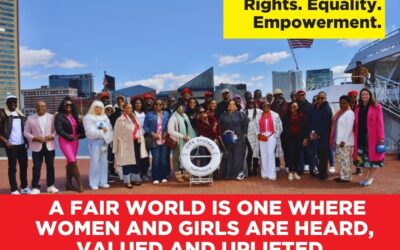Since 1981 when the 25th of November every year was selected by women’s rights proponents as a day to mark the battle against gender-based violence, individuals, advocacy organisations, and governments across the world have continued to take negative stock in the face of increased frequency, variety and brutality of the societal menace.
As the world celebrates another anniversary of the International Day for the Elimination of Violence against Women and Girls, this year’s event once again, offers itself as a sturdy podium upon which to stand and, not just bemoan the sad fate of the very victims and survivors whom we remember today, but to chart better strategies for curbing the menace.
The appalling statistics which cast a long and gloomy shadow over last year’s commemoration have continued almost unabated, and have, in fact worsened in different respects. In the first quarter of 2022, for instance, over 335 persons in Nigeria experienced different types of sexual and gender-based violence. This phenomenon is largely as a result of widening gender disparity, socio-economic imbalance, and a patriarchal system in some parts of the country that relegates women to almost subhuman levels. It represents one of the most disturbing forms of human rights abuses which include physical violence, sexual violence, emotional and psychological violence, and socioeconomic violence.
We have followed with growing concern, the worrisome spike in physical and/or sexual intimate partner violence, or non-partner sexual abuse. The fact that over 35% of women across the globe have been through these ordeals this year, and that almost 40% of murder cases involving women at the hands of intimate partners leaves a sour taste in the mouth. It is an unsavoury state of affairs made even worse by a situation which has only 6% of victims of sexual abuse being able to muster the courage to report.
In Nigeria, the political arena is replete with violence against women, which sadly has been on a steady increase. A study conducted between October 2021 and April 2022, by the non-governmental organisation, Stand To End Rape (STER) funded by Action Aid through the Strategic Innovative Fund titled: Vulnerable and Outside the Margins: From Challenges to Informed Inclusion: “A study on violence against women in the political space”, identified varying degrees of violence against women in politics. According to the report “women actively in the political space via elections or appointments, women and girls who have a familial association with a politician, women who are political activists or those who are involved as officials or ad hoc staff of electoral bodies have been directly targeted by thugs and criminals for physical violence, including sexual abuse”.
This year’s theme – UNiTE to End Violence Against Women – is a global clarion call for increased support and solidarity in ensuring that the great gains attained so far in pursuit of women’s rights are not reversed due to inaction. The global petitions and actions orchestrated since 2009 when the UNiTE platform was launched have added new fillip to advocacy efforts across the world.
The National Association of Seadogs (Pyrates Confraternity) joins the kick off of this year’s 16 Days of Activism Against Gender-Based Violence, which culminates on 10th December. We remain as strident as we have been over the years in coming together with like minds across the globe to mitigate, and eliminate what has become a potent and pervasive scourge.
In its 70 years of existence as a humanitarian and advocacy organisation at the forefront of expanding the frontiers of rights and freedoms everywhere, NAS/PC has remained undaunted in its resolve to promote women’s rights, and to root out all the evils that continue to threaten womenfolk, especially in Nigeria.
Worried by the silence of the graveyard which surrounds most rape cases in Nigeria, the NAS/PC, in June 2020, released a comprehensive 60-page document titled Rape Survivors’ Guide – A Simple Guide For Victims In Nigeria. This was a document prepared in collaboration with the Legal Assistance and Citizens’ Rights Initiative (LACRI), and which detailed the journey that rape victims need to undertake in order to bring closure whilst getting justice. The report highlighted the rights of rape victims, the urgent need to speak up, the most important steps to take, the police, medical and judiciary angles, and a vast contact list of governmental and nongovernmental support organisations. We hope to leverage on this groundbreaking project, and seek further ways of alleviating the most urgent concerns of women at the receiving end of different species of abuse.
As the world marks this international day, we urge stakeholders across state and non-state realms to keep raising the bar in terms of public awareness, robust legislation and policy making, increased funding of women’s causes, and conscientious enforcement of women’s rights and privileges.
We urge states yet to domesticate the Violence Against Persons (Prohibition Act) to do so urgently. The VAPP is a robust legislation that should be supported by all stakeholders as part of concerted efforts to eliminate violence against women.
Only a global effort in this direction will help reduce the great burden that women have borne for millennia; a burden that remains as worrisome as ever.
Abiola Owoaje
NAS Capoon
Abuja


![[PRESS RELEASE] AFFIRMATION OF EMERGENCY RULE IN RIVERS STATE THROUGH “AYES AND NAYS”](https://www.nas-int.org/wp-content/uploads/2025/03/National-Assembly-Ayes-and-Nays-400x250.jpeg)

